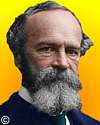 (source)
(source)
|
William James
(11 Jan 1842 - 26 Aug 1910)
American psychologist and philosopher who has been called 'Father of American Psychology' but later in life pursued philosophy, became one of founders of pragmatism, and wrote seminal works including The Meaning of Truth (1909).
|
William James Quotes on Habit (6 quotes)
>> Click for 49 Science Quotes by William James
>> Click for William James Quotes on | Mind |
>> Click for 49 Science Quotes by William James
>> Click for William James Quotes on | Mind |
Could the young but realize how soon they will become mere walking bundles of habits, they would give more heed to their conduct while in the plastic state. We are spinning our own fates, good or evil, and never to be undone.
— William James
'The Laws of Habit', The Popular Science Monthly (Feb 1887), 451.
For this we must make automatic and habitual, as early as possible, as many useful actions as we can, and guard against the growing into ways that are likely to be disadvantageous to us, as we should guard against the plague?
— William James
'The Laws of Habit', The Popular Science Monthly (Feb 1887), 434.
From a pragmatic point of view, the difference between living against a background of foreigness (an indifferent Universe) and one of intimacy (a benevolent Universe) means the difference between a general habit of wariness and one of trust.
— William James
…...
Genius, in truth, means little more than the faculty of perceiving in an unhabitual way.
— William James
In Psychology (1904), 328.
Habit is thus the enormous fly-wheel of society, its most precious conservative agent. It alone is what keeps us all within the bounds of ordinance, and saves the children of fortune from the envious uprisings of the poor. It alone prevents the hardest and most repulsive walks of life from being deserted by those brought up to tread therein.
— William James
'The Laws of Habit', The Popular Science Monthly (Feb 1887), 447.
Plasticity, then, in the wide sense of the word, means the possession of a structure weak enough to yield to an influence, but strong enough not to yield all at once. Each relatively stable phase of equilibrium in such a structure is marked by what we may call a new set of habits. Organic matter, especially nervous tissue, seems endowed with a very extraordinary degree of plasticity of this sort ; so that we may without hesitation lay down as our first proposition the following, that the phenomena of habit in living beings are due to plasticity of the organic materials of which their bodies are composed.
— William James
'The Laws of Habit', The Popular Science Monthly (Feb 1887), 434.
See also:
- 11 Jan - short biography, births, deaths and events on date of James's birth.


 In science it often happens that scientists say, 'You know that's a really good argument; my position is mistaken,' and then they would actually change their minds and you never hear that old view from them again. They really do it. It doesn't happen as often as it should, because scientists are human and change is sometimes painful. But it happens every day. I cannot recall the last time something like that happened in politics or religion.
(1987) --
In science it often happens that scientists say, 'You know that's a really good argument; my position is mistaken,' and then they would actually change their minds and you never hear that old view from them again. They really do it. It doesn't happen as often as it should, because scientists are human and change is sometimes painful. But it happens every day. I cannot recall the last time something like that happened in politics or religion.
(1987) -- 


